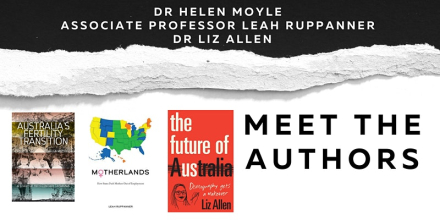Meet the Authors

Each author will have 5 minutes to pitch their book, followed by questions from moderator Andrew Howe.
Andrew Howe is an accomplished demographer with the Australian Bureau of Statistics as well as Australia’s premier football statistician. His statistics, facts and historical analyses are relied upon by Football Federation Australia, Professional Footballers Australia, official broadcaster FOX Sports and all media. He has authored several books including the Encyclopedia of Matildas and Encyclopedia of Socceroos

Dr Helen Moyle has been a social researcher for most of her career. She has held senior positions with the Australian Institute of Family Studies, the Australian Institute of Health and Welfare and Commonwealth Government Departments. She has a PhD in Demography from The Australian National University and is an Honorary Fellow at the University of Melbourne.
Her book, Australia’s Fertility Transition: A study of 19th-century Tasmania investigates the fertility transition in Tasmania, the second settled colony of Australia, using both statistical evidence and historical sources including the 1904 New South Wales Royal Commission into the Fall in the Birth Rate.
Many theories have been proposed as to why fertility declined at this time including economic theories, the spread of secularisation and changes in rates of infant and child mortality. The role of women in the fertility transition has generally been ignored. The investigation concludes that fertility declined in Tasmania in the late 19th century in a period of remarkable social and economic transformation, with industrialisation, urbanisation, improvements in transport and communication, increasing levels of education and opportunities for social mobility. One of the major social changes was in the status and role of women, who became the driving force behind the fertility decline.

Associate Professor Leah Ruppanner is an Associate Professor of Sociology and Co-Director of The Policy Lab at the University of Melbourne. She is an expert in family, gender, public policy, cross-national research and quantitative methods. Her current research focuses on barriers to maternal employment, female representation in government and gender inequality in the home.
Her book, Motherlands: How States Push Mothers out of Employment published in 2020, provides an innovative framework for understanding how U.S. states vary in their childcare policies, gender empowerment and maternal employment.
In the absence of federal legislation, each state in the United States has its own policies regarding family leave, job protection for women, and childcare. Whereas conservative states like Nebraska offer affordable, readily available, and high quality childcare, progressive states that advocate for women’s economic and political power, like California, have expensive childcare, shorter school days, and mothers who are more likely to work part-time or drop out of the labor market altogether to be available for their children.
In Motherlands, Leah Ruppanner cogently argues that states should look to each other to fill their policy voids. She provides suggestions and solutions for policy makers interested in supporting working families and advocates for reducing the institutional barriers mothers face when re-entering the workforce. As a result, women would have greater autonomy in making employment decisions following childbirth.

Dr Liz Allen
Dr Liz Allen is a highly skilled demographer and social researcher with quantitative and qualitative expertise. Liz has considerable experience working in the public and academic sectors. She’s presently a postdoctoral fellow at the ANU College of Arts and Social where she uses her analytic skills to provide much-needed information about data (for example the census and marriage postal survey) or population dynamics (for example immigration and fertility).
Liz has written numerous pieces for The Conversation, scholarly articles in academic journals and contributions to research reports. She was named in the inaugural ABC Top 5 Humanities and Social Sciences academics in Australia 2018. She can be found on social media under the alter-ego of @DrDemography.
By tracing connections between a population's past and present, demographers can foresee its future. The true wonder of demography, though, is not its ability to predict the future but to shape it. With energy and passion, in The Future of Us Liz Allen sets out the potential paths to make Australia better.
Bold, fearless and revealing, The Future of Us does more than help you find your inner statistician. Looking beyond births, deaths and marriages, Allen takes apart inequality, migration, tax and home ownership. She also dissects how the word 'population' became so charged, daring to ask what Australia might look like in 20 years if we had zero immigration. The Future of Us gives demography a makeover and sets out future possibilities for a better us … just like a Choose Your Own Adventure, but for the nation.






